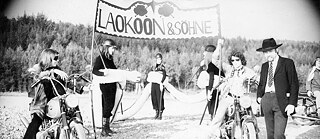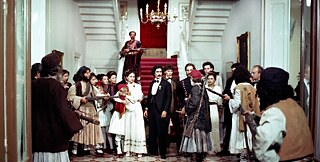Film Screenings
Episode 1: History and Myth

German-Greek Filmic Dialogues on the Past and Future
HISTORY PROJECTED
Film screenings program in collaboration with Ethnofest
Through a series of screenings that unfold over the course of 2024, Greek and German short and feature films introduce their own dialects and dialectics, assembling different approaches to a common historical past. Micro-narratives and off-beat, soft testimonies in the plural form; studies on mythology and role-plays with masks of national identity; jigsaw puzzles with fragments from the archive; loud and invisible gestures and artifacts break the distance from historical sources and prompt surprising readings on different sides of the border. In the end, history is brought to the present and projected into the future, whereas the language of cinema renders history a sensation, an instinct, and a collective experience.
EPISODE 1
27.03.2024 Episode 1: History and Myth
Laokoon und Söhne. Die Verwandlungsgeschichte der Esmeralda del Rio [Laocoon and Sons. The Story of the Transformation of Esmeralda del Rio], Ulrike Ottinger, 1972/73, 50΄
On the Time of Hellenes, Lakis Papastathis, 1981, 98΄
Attempts at appropriating ancient Greek myths fling into the inexhaustible pool of modern history, in two distinct cinematic gestures of exploring contemporary European and national identity. On the one hand, the debut feature by New German Cinema trailblazer Ulrike Ottinger flirts with camp, Dionysian spirit, and Dadaism, to deliver a unique artwork of experimental ethnography. On the other hand, the first feature-length fiction film by Lakis Papastathis – one of the most influential figures in the evolution of Greek documentary – follows the adventurous route of an abduction at the turn of the century; eventually, he unfolds an essentially unique vision of the past’s imprint onto the present. In the end, the Greek word for tradition translates as a gift, an act of concession or surrender, a legacy, or a consignment.
18:30
Laokoon und Söhne. Die Verwandlungsgeschichte der Esmeralda del Rio [Laocoon and Sons. The Story of the Transformation of Esmeralda del Rio]

19:30
On the Time of Hellenes

Ulrike Ottinger has been a unique and provocative voice in German cinema since her debut in the early 70s. Over the past 40 years, she has directed 26 films, including feature-length fictions and experimental documentaries. She received numerous awards, including the Audience Jury Prize in Montréal, the Bundesfilmpreis and the German Film Critics Award. Her films have been shown at many retrospectives, including the Cinémathèque française and Centre Pompidou in Paris, the Reina Sofía in Madrid and the Museum of Modern Art in New York. Ulrike Ottinger has been a photographer throughout her career presenting works at the Biennale di Venezia, the Documenta, and the Berlin Biennale, among others. She has also worked as a theater director and ethnographer and she has published several books.
Lakis Papastathis (1943–2023) was born in Volos and grew up on the island of Lesbos. He shot his first short film (Cases of No) in 1965, while in the period 1970–71 he collaborated as an assistant director with Alexis Damianos on the filming of Evdokia. His third short film (Letters from America) won the First Prize at the Thessaloniki Greek Film Festival in 1972. He shot four feature-length fiction films: On the Time of Hellenes (1981), Theophilos (1987), To monon tis zois tou taxeidion (2001) and Journey to Mytilene (2010). In 1970, together with Takis Hatzopoulos, he founded Cinetic, a production company that became known for its television productions [Historical Archive (1975–1976), (1990–1997), The Revival of Ancient Drama (1998 and, more importantly, for the documentary series Paraskinio (1976–2013) which is the longest-running show on Greek television. He also published five short story collections.
Details
Goethe-Institut Athen
Omirou 14-16
106 72 Athens
Language: German, English, Greek
Price: Free admission
+30 210 366 1014
kultur.athen@goethe.de
Part of series History Projected
Amphitheater